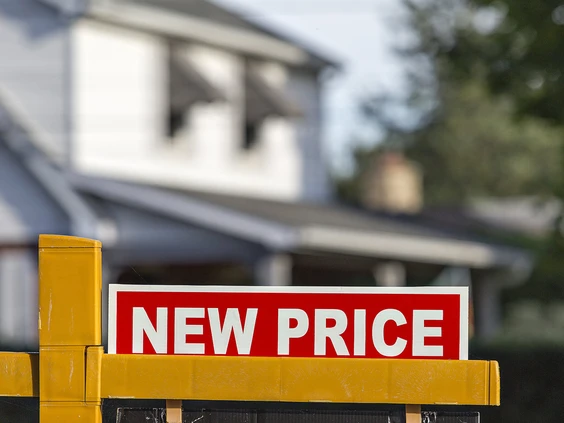
Home prices in Canada’s biggest markets ended 2022 well below the soaring peaks posted earlier in the year. Now the question is: How much further do they have to fall? According to local real estate boards, the composite benchmark price for a home in the Greater Toronto Area (GTA) peaked at $1,370,000 in March of 2022, while homes in Vancouver topped out at $1,374,500 in April and Calgary homes hit a high of $546,000 in May. When comparing each region’s peak against December’s benchmark price results, Toronto, Vancouver, and Calgary have dropped by 21 percent, 19 percent, and nearly five percent, respectively. In all cases, the declines commenced after the Bank of Canada began to raise interest rates in March — whether prices continue to fall in 2023 may depend as much on the path of interest rates as anything else.
BMO chief economist Douglas Porter, for one, projects that high-interest rates will continue to pummel the housing market in 2023, predicting home prices slip another 12 percent and sales fall another 15 percent. "We don't look for rate relief until 2024", he said in a December 23rd note to clients.
For other industry experts, the consensus seems to be that home prices will slide in 2023, but that the bottom is in sight.
They reason that the anticipated demand for housing from the record number of immigrants expected to settle in the nation’s major housing markets — in addition to interest from buyers who have been waiting for lower prices — will offer support.
“If we don’t see a meaningful shift upwards in terms of supply then that would start to exert upward pressure on prices once again,” Toronto Regional Real Estate Board (TRREB) chief market analyst Jason Mercer said in an interview.
In June, The Canada Mortgage and Housing Corporation (CMHC) concluded that the country would need to build 3.5 million new homes by 2030 to reduce its shortfall and improve affordability — but follow-up research found that there will only be enough labor to increase the number of starts in four major provinces — Ontario, Québec, B.C., and Alberta — by 30 to 50 percent. Porter said that he believes it will be impossible for governments to deliver the number of housing starts they've promised in coming years.
It showed there were 152,873 new listings reported through TRREB’s MLS system in 2022 — an 8.2 percent decline compared to 166,600 new listings in 2021. Home sales, at 75,140 units, did not fair any better, down 38.2 percent from 2021’s record of 121,639 units.
The average price of a home sold over the course of the year checked in at $1,189,850 - about 8.6% above the average selling price in 2021 - but those gains were mostly attributable to the beginning of the year. On a month-over-month basis, December's composite benchmark price was down just 0.77 percent to $1,081,400 from $1,089,800 in November, though the average selling price was down 9.28%.
TRREB CEO John DiMichele said that there are two opposing forces buffeting the housing market. “On the one hand, we will continue to feel the impact of higher borrowing costs. On the other hand, record levels of immigration will support demand for ownership and rental housing, while we struggle to come to terms with a housing and infrastructure deficit in the Greater Golden Horseshoe,” DiMichele said in the report.
Figures for Montreal were also released Thursday. The Quebec Professional Association of Real Estate Brokers said that home sales in Montreal fell 39% in December from earlier to a level not seen since 2014.
Information from Financial Post January 6th
